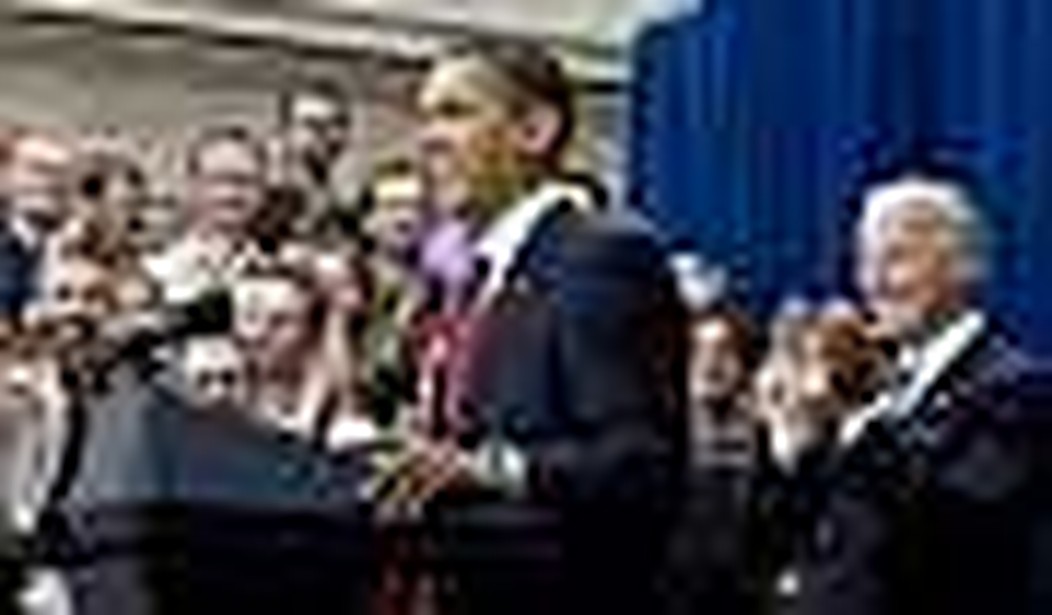John Edwards was right: there are two Americas. No, I am not talking about the one with the hedge funds and the one with the girl with no coat. The real divide is between the political and economic, between those obsessed with politics and those determining our economic future.
In the former realm reside the politicians, political pundits, and the MSM reporters. In their world, Barack Obama is unblemished and riding “sky-high,” the stimulus was a political triumph, and the front page stories are the signing ceremony for the stimulus bill, Roland Burris’ potential perjury problems, and the prospects for new commerce and health and human services secretaries.
In the economic realm all of this is piffle. To recap: the ABC Consumer Comfort Index hit its lowest level in over 20 years this month and the Rasmussen Consumer Index also hit rock bottom (the day after the stimulus bill passed). Unemployment is at 7.6% and may well climb for at least another year. Even before yeaterday’s 300 point drop in the Dow, the markets had been diving. Since Election Day the Dow has plunged from 9600 to below 7600 (more than a 20% drop). And gold prices are soaring, a continued signal that confidence in the dollar and U.S. economy is waning.
In the print or TV political news the reporters ponder whether it was smart to have allowed Nancy Pelosi to draft the stimulus bill and whether the Republicans blew it by not climbing on the stimulus bandwagon. Watch the business news and the discussion is whether the markets have entirely lost faith in Treasury Secretary Tim Geithner and if there is any place other than gold to park your money.
In short, the discussion among the politicians and the political media elites is entirely divorced from economic reality. The gurus who populate the cable network political pseudo-news shows rarely even mention how the president and Congress are being perceived by the markets and how they are impacting the real world of financial decisions.
It is not surprising that political reporters, largely ignorant of economics, wouldn’t plunge into a discussion, for example, of the specifics of the bond market. But you think they might look up from the fleeting and erratic political popularity polls to see if forward-looking indicators of actual behavior — consumer confidence ratings and the stock market, in particular — are reacting positively or negatively to the Democrats’ political “triumphs.”
And after all, whether you believe the stimulus was an abysmal display of pork barrel, business-as-usual politics and non-transparency, or a bold first move by the new president, either argument will be moot if the stock market slides another 20% or unemployment hits double digits. If at the next Treasury auction, the U.S. government finds investors less interested in buying up more and more debt, it won’t matter what Barack Obama’s popularity rating was in February 2009.
It is true that the stimulus bill was just passed so we have barely begun to feel its real-world impact. But consumer confidence indicators and the stock market are predictive of future behavior. If investors are fleeing to gold and selling stocks, consumers are not planning any major purchases, and the banks are declaring a lack of confidence in the man charged with the bank bailout, that says something about the Democrats’ handiwork so far.
And it is certainly true that the president’s own gloom and doom rhetoric has not helped matters. It is possible to talk down the market and scare consumers. There is a fine line between lowering expectations and creating a self-fulfilling prophesy. The former is largely a political exercise by a White House in continual campaign mode and wary about popularity polls. The latter should be a concern for everyone wondering if the stimulus will “work.”
Eventually the two realms — economic and political — will collide. As elections draw near politicians on both sides and the MSM political coverage become very interested all of a sudden in the CPI, the Dow Jones, the trade deficit, and other financial indicators of our economic health. But perhaps the chattering political class would do well now to turn off Hardball and Anderson Cooper 360 and watch the business news for a few hours each week. There they will see the people who, to a much larger degree than they ever imagined, control the progress of the economy. And they will see that those people — investors, CEOs, and economic analysts — are giving thumbs down so far on both the rhetoric and the “accomplishments” of the Obama administration and the Democratic Congress. To be blunt, if this were the British Parliament there would be a “no confidence” vote in the government — yet the MSM barely notices.
That may change in time. Perhaps Obama will offer some pro-investor policies. Maybe Geithner will regain his footing. And perhaps Democrats in general will rethink the entire bailout mania which is giving business the shivers. But for now it appears that the Democrats’ great triumphs are going over like a lead balloon. You would think that would be the “real” news of the day.









Join the conversation as a VIP Member